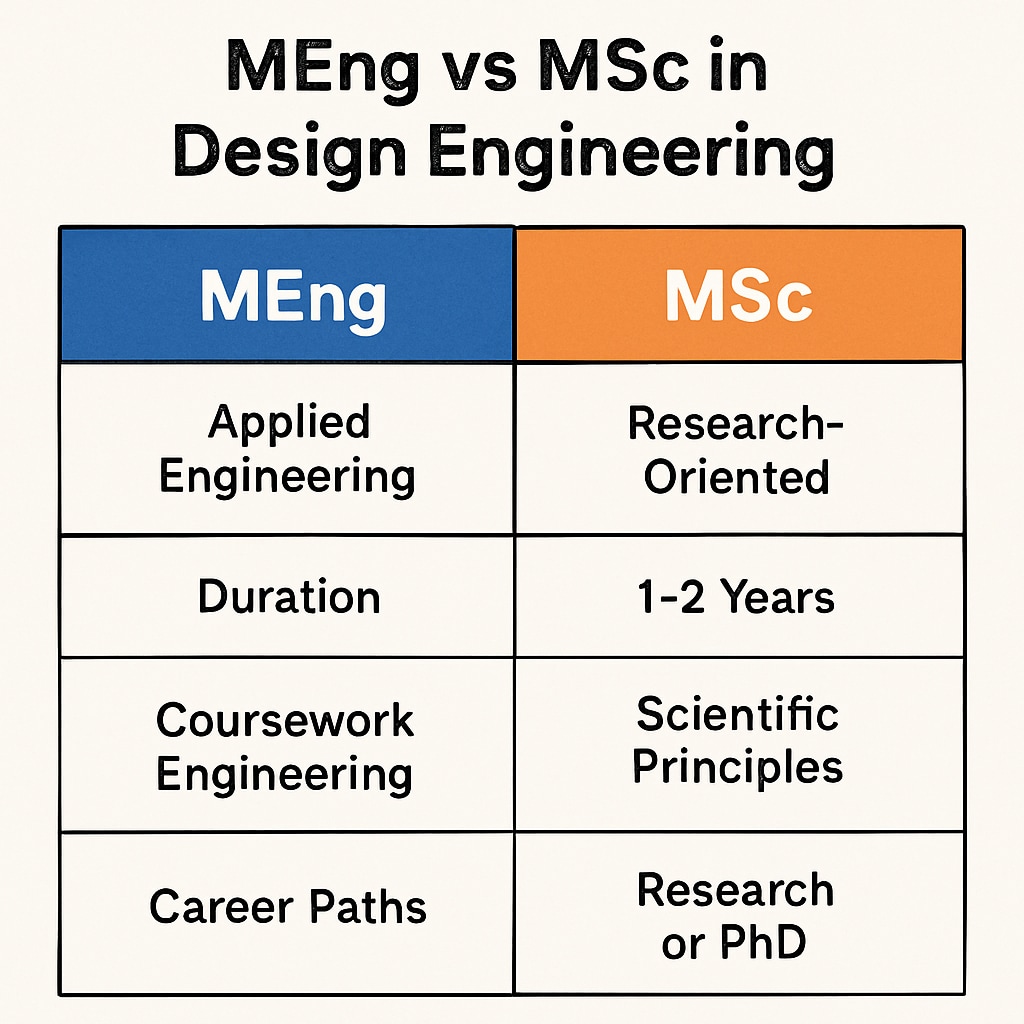The choice between different degrees in design engineering, such as bachelor’s and master’s programs, including MEng (Master of Engineering) and MSc (Master of Science), can significantly impact career prospects. Understanding these distinctions is crucial for students and parents aiming to make informed decisions that align with long-term educational and professional goals.
MEng vs MSc: Key Differences and Considerations
When considering postgraduate studies in design engineering, students often face the choice between MEng and MSc programs. While both degrees offer advanced knowledge and skills, their focus and outcomes can differ.
- MEng (Master of Engineering): This degree is typically more industry-oriented, emphasizing practical application and project-based learning. It is ideal for students aiming to work directly in the engineering sector or lead large-scale technical projects.
- MSc (Master of Science): An MSc in design engineering often leans towards research and theoretical frameworks. It is a better fit for those considering academic careers, advanced research roles, or specialized technical expertise.
Both degrees can lead to lucrative careers, but the choice often depends on individual interests and career ambitions. For example, students interested in innovation and product development may benefit from an MEng, while those focused on theoretical research might prefer an MSc.

Career Opportunities with a Design Engineering Degree
Design engineering graduates, whether holding a bachelor’s or master’s degree, are highly sought after in industries ranging from automotive to aerospace, and even consumer technology. However, the degree level and type can influence specific career paths.
- Bachelor’s Degree: Graduates with a bachelor’s degree often start in entry-level engineering roles, such as design assistant or junior technical engineer. These roles provide foundational experience and can lead to mid-level positions with time.
- MEng and MSc Degrees: Master’s degree holders typically qualify for advanced roles, such as project manager, senior design engineer, or research and development specialist. Furthermore, they may have access to higher salaries and faster career advancement.
For example, an MEng graduate might lead the development of a new product while an MSc graduate could focus on optimizing its functionality through research. Employers often value the specialized skills that master’s programs provide, making postgraduate education a worthwhile investment.

Factors to Consider When Making Your Degree Choice
Before committing to a specific program, students should evaluate several factors to ensure their choice aligns with career goals and personal interests:
- Career Aspirations: Identify whether you aim for a hands-on industry role or a research-focused career. This will help narrow your choice between MEng and MSc programs.
- Program Structure: Review the curriculum, internships, and project work offered by each program. Practical exposure can significantly boost employability.
- Cost vs Benefit: Consider tuition fees and potential return on investment in terms of salary and career growth.
- Accreditation: Ensure the program is accredited by relevant engineering bodies, as this can impact job eligibility and professional recognition.
By thoroughly analyzing these factors, students can make a well-informed decision that supports their long-term success in the dynamic field of design engineering.
For more information on engineering degrees and career prospects, visit authoritative sources such as Engineering on Wikipedia or Engineering on Britannica.
Conclusion: Investing in Your Future
Choosing the right degree in design engineering is more than an academic decision—it’s an investment in your future. Both MEng and MSc programs offer unique advantages, making it essential to align your choice with career ambitions and personal interests. Whether you’re a student or parent guiding this process, understanding the distinctions between these degrees can lead to a brighter, more successful professional journey.
Design engineering continues to evolve, offering exciting opportunities for innovation and growth. By selecting the right educational path, you can position yourself for a rewarding career in this dynamic field.
Readability guidance: Using short paragraphs, clear lists, and moderate sentence length ensures the article remains accessible. The content employs a professional tone while maintaining engagement through practical examples and actionable advice.


